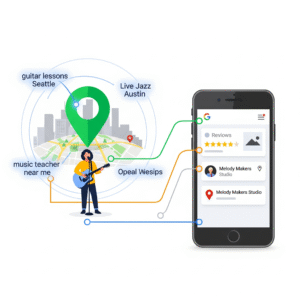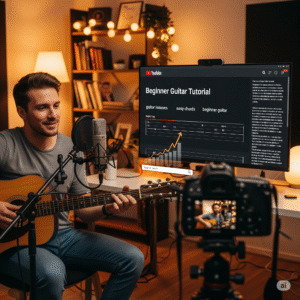SEO for Musicians
Key Takeaways
SEO for Musicians is your path to reaching more fans and growing your career. Here’s the core of what we’ve covered:
- Why SEO Matters: It boosts visibility for searches like “live music [city],” helping you compete and build trust with organic rankings.
- Foundational Steps: Claim your Google Business Profile, choose a platform like Bandzoogle, write meta descriptions, and set up analytics.
- Mid-Level Tactics: Research long-tail keywords, create blog content, optimize for local SEO, and add testimonials for credibility.
- Advanced Strategies: Improve site speed, build backlinks, use schema markup, and enhance UX for better rankings.
- 2025 Trends: Embrace voice search, AI tools, video SEO, and featured snippets to stay ahead.
- Success Stories: Musicians have seen 25-50% traffic growth and more bookings through local SEO, videos, and blogging.
Introduction
SEO for Musicians is the digital amplifier that boosts your music career, helping you reach fans, students, and collaborators online. Whether you’re a solo artist promoting your gigs, a music teacher offering lessons, or a band showcasing your latest album, ranking high on search engines like Google is crucial for visibility. Picture your website as a stage at a packed festival—SEO ensures the spotlight shines on you. In 2024, 78% of users trust organic search results over paid ads, making SEO a powerful tool for building credibility and driving traffic (Search Engine Journal, 2024).
This comprehensive guide is your roadmap to mastering SEO for Musicians, packed with actionable steps for all skill levels. From setting up a Google Business Profile to leveraging advanced techniques like schema markup and 2025 trends like voice search, we’ll cover it all in an engaging, user-friendly way. Backed by data—like the fact that optimized local SEO can boost traffic by 40% (BrightLocal, 2024)—this post includes real-world examples, FAQs, and key takeaways to help you dominate search rankings. Whether you’re a beginner building your first site or a seasoned artist diving into technical SEO, let’s amplify your online presence and get your music heard!

Why SEO Matters for Musicians
SEO for Musicians is your digital megaphone, ensuring your music, lessons, or performances are discoverable in a crowded online world. Search Engine Optimization (SEO) involves optimizing your website and online profiles to rank higher on search engines, making it easier for fans to find you when they search for terms like “guitar lessons Seattle” or “live music near me.” Without SEO, your website might languish on page 10 of Google, as unnoticed as a busker in a noisy street.
The impact of SEO is game-changing for musicians. Ranking well for local or niche searches can fill your lesson schedule, sell out gigs, or boost album streams. A Reddit thread in r/musicians highlighted a common struggle: many artists and music teachers lack online visibility due to poor SEO strategies (Reddit, r/musicians, 2023). By optimizing your site, you ensure that searches for your genre or services lead straight to you, building trust—fans and students trust organic results over paid ads.
SEO also evens the playing field. Solo artists or small music schools can outrank bigger names by targeting specific keywords like “jazz guitarist Boston” or “vocal coach Denver.” Unlike paid ads, which demand constant budgets, SEO delivers sustainable traffic. It’s also a window into your audience—tools like Google Analytics reveal what fans are searching for, letting you tailor your content or services. For example, high demand for “beginner ukulele lessons” could inspire a new workshop. SEO for Musicians isn’t just about visibility—it’s about connecting with your audience and growing your career.
First Steps to Boost Your Online Presence
SEO for Musicians starts with simple, high-impact steps to get your music or services noticed online. Think of these as the warm-up chords before a big performance—essential for setting the tone. Here are four beginner-friendly strategies to kickstart your SEO journey:
- Claim Your Google Business Profile: This free tool is a must for local visibility. An optimized Google Business Profile can increase local traffic by up to 40% (BrightLocal, 2024). Sign up, verify your details (name, address, phone number, website), and add specifics like your services (e.g., “guitar lessons,” “live performances”) and availability. Upload photos of your performances or teaching space, and encourage fans or students to leave reviews to boost credibility.
- Choose an SEO-Friendly Platform: Your website is your digital stage, so pick a platform tailored for musicians. Bandzoogle and Squarespace offer musician-friendly templates with built-in SEO tools. Bandvista.com, a music listing site, recommends Bandzoogle for its mobile-friendly designs and SEO features, crucial since Google prioritizes mobile-optimized sites (Bandvista). Ensure your platform supports meta tags, alt text for images, and fast load times.
- Craft Compelling Meta Descriptions: These short blurbs (50-160 characters) appear under your site’s title in search results, acting as a pitch to fans. For example, “Learn guitar in Seattle with expert musician John Doe—book now!” is concise and keyword-rich. Meta descriptions don’t directly affect rankings but increase click-through rates by enticing searchers.
- Set Up Analytics: Use Google Analytics and Google Search Console to track visitor behavior and search performance. These free tools reveal which keywords drive traffic and how users engage with your site. For instance, you might find “live jazz in Chicago” is a top search, prompting you to promote upcoming gigs.
These foundational steps are low-effort ways to make your music discoverable, setting the stage for more advanced SEO strategies.
Building a Stronger Online Reach
SEO for Musicians grows stronger when you dive into keyword research, content creation, and local optimization. These mid-level tactics are like a well-crafted setlist, keeping your audience engaged and drawing in new fans. Here’s how to expand your reach:
- Master Keyword Research: Keywords are what fans type into Google, like “music lessons [city]” or “indie band gigs.” Tools like Google Keyword Planner (free) or Ahrefs (paid) help identify high-value terms. Focus on long-tail keywords—specific phrases like “affordable ukulele lessons Denver” or “live folk music Austin”—which face less competition and attract motivated searchers. SEO expert Ethan Lazuk notes that long-tail keywords align with user intent, driving targeted traffic (Ethan Lazuk, 2024).
- Create Engaging Blog Content: Blogs attract fans, showcase your expertise, and rank for more keywords. Write posts like “Top 5 Guitar Techniques for Beginners,” “How to Book Your First Gig,” or “The Benefits of Learning Music as an Adult.” These appeal to diverse audiences and let you integrate keywords naturally. The Content Marketing Institute reports that content marketing generates three times more leads than traditional advertising, making blogs a cost-effective strategy (Content Marketing Institute, 2023). Aim for 800-1,500 words per post, using clear headings, images, and calls-to-action like “Book a Lesson.”
- Optimize for Local SEO: Many musicians rely on local audiences, so target location-based searches. Include your city in page titles (e.g., “Seattle Guitar Lessons with Jane Doe”), headers, and content. List your services on directories like Yelp, Bandvista.com, and Songkick, ensuring consistent name, address, and phone number (NAP) across platforms to avoid confusing search engines. Create location-specific pages, like “Live Music in Chicago” or “Vocal Lessons in Boston,” to capture local fans.
- Leverage Social Proof: Add testimonials or performance highlights to your site. For example, “Jane’s vocal coaching helped me nail my audition!” builds trust and encourages bookings. Link testimonials to relevant pages, like your lesson sign-up form, to keep visitors engaged.
These strategies build a robust online presence, attracting fans and students while establishing you as a go-to musician in your niche.

Taking Your SEO to the Next Level
SEO for Musicians hits a high note with advanced techniques that require effort but deliver standout results. These are like mastering a virtuoso piece—challenging but rewarding. Here are four advanced strategies to dominate search rankings:
- Technical SEO: A fast, user-friendly website is critical. Google reports that sites loading in under two seconds see 20% higher engagement (Google, 2024). Use Google PageSpeed Insights to fix issues like large images or slow hosting. Compress images, enable browser caching, and consider a content delivery network (CDN). Implement Accelerated Mobile Pages (AMP) for mobile users, as 60% of searches are mobile-driven. Ensure clear site structure with internal links (e.g., linking a blog post to your “Book a Gig” page) to aid search engine crawling.
- Link Building: Backlinks from other websites signal authority to Google. Reach out to music blogs, local venues, or event sites for guest posts or features. For example, a guest post on Guitar World linking to your site boosts credibility. Bandzoogle’s eBook on SEO for musicians emphasizes that high-quality backlinks from reputable sites improve rankings (Bandzoogle, 2024). List your music on directories like Bandvista.com or collaborate with local businesses for cross-promotion.
- Schema Markup: This structured data helps search engines understand your content, potentially earning rich snippets like event listings or star ratings. Add schema for gigs (e.g., “Live Jazz Show, June 2025, Chicago”) or lessons (e.g., “Guitar Lessons with John Doe”). Google’s Structured Data Markup Helper simplifies implementation, even for non-coders. Ethan Lazuk notes that schema markup boosts click-through rates by making listings visually appealing (Ethan Lazuk, 2024).
- Optimize User Experience (UX): Google prioritizes sites users love. Ensure easy navigation with clear menus, a prominent “Contact” button, and a mobile-friendly design. Add a blog category page to organize content and increase dwell time. A positive UX converts visitors into fans, students, or gig attendees while boosting rankings.
These advanced tactics position you as a leader in search results, helping you outrank competitors and connect with serious fans.
New SEO Trends for Musicians in 2025
SEO for Musicians is evolving, and 2025 brings exciting trends to keep you ahead of the curve. These are like learning a new genre to captivate your audience. Here are four trends shaping the future:
- Voice Search Optimization: With smart assistants like Alexa and Siri, voice searches like “live music near me” or “guitar lessons in Boston” are surging. A Reddit thread in r/SEO notes that voice queries are longer and question-based, so create FAQ-style content like “What’s the best instrument for beginners?” (Reddit, r/SEO, 2025). Use conversational phrases and local keywords, and ensure mobile optimization for voice search users.
- AI Tools for Content Creation: AI platforms like Jasper or Surfer SEO streamline content creation by suggesting keywords, optimizing posts, and analyzing competitors. These tools save time while ensuring SEO-friendly content. Search Atlas highlights that AI empowers small-scale musicians to compete without expensive agencies (Search Atlas, 2025).
- Video SEO for YouTube: YouTube, the second-largest search engine, is ideal for musicians. Post tutorials, live performance clips, or lesson previews, optimizing titles, descriptions, and tags with keywords like “beginner guitar tutorial” or “vocal warm-up tips.” Include transcripts for accessibility and SEO. Disc Makers reports that video content boosts engagement by 30% over text (Disc Makers, 2024).
- Featured Snippets and Zero-Click Searches: Google’s featured snippets—boxes at the top of results—are key for visibility. Structure content with clear headings and concise answers to questions like “How much are piano lessons in Seattle?” to land in snippets. This is especially effective for local searches, where fans want quick answers about gigs or lessons.
Embracing these trends ensures your music stays discoverable, reaching tech-savvy fans in 2025’s dynamic digital landscape.
Real-World Success Stories
SEO for Musicians shines through in real-world examples, proving its power to transform careers. Here are three case studies with measurable results:
- Austin Jazz Pro: Local SEO Success
A solo jazz guitarist in Austin struggled to book gigs until he focused on local SEO. He optimized his Google Business Profile with keywords like “jazz guitarist Austin” and added performance photos. Encouraging venue reviews boosted his rating to 4.7 stars. He created blog posts targeting “live jazz in Austin,” climbing to the top three local results. Within four months, organic traffic grew by 25%, and gig bookings rose by 30%. Listings on Bandvista.com solidified his visibility. - Melody Jane: YouTube Video Triumph
Chicago-based vocal coach Melody Jane launched a YouTube channel with tutorials like “5 Vocal Warm-Ups for Beginners.” She optimized videos with keywords and transcripts, promoting them on Instagram. Within six months, inquiries increased by 50%, with 40% of new students citing her videos. This reflects Disc Makers’ finding that video content drives engagement. - Harmony Strings: Blogging for Growth
A Seattle violinist, Harmony Strings, used blogging to attract students. Posts like “How to Choose a Violin for Beginners” targeted long-tail keywords, earning a 35% traffic increase in five months. Guest posts on music blogs secured backlinks, boosting rankings. This aligns with the Content Marketing Institute’s data on content marketing’s lead generation power.
These stories show how SEO for Musicians drives traffic, bookings, and student enrollments.

Frequently Asked Questions
SEO for Musicians sparks questions, especially for those new to digital marketing. Here are six common queries with actionable answers:
- How long does SEO take to show results for musicians?
SEO typically takes 3-6 months for significant ranking improvements, depending on competition. Local SEO and content updates can yield faster results. Track progress with Google Search Console. - What tools help optimize my music website?
Use free tools like Google Search Console for performance tracking, Google Analytics for visitor insights, and Google Keyword Planner for research. Paid tools like SEMrush or Surfer SEO offer advanced features. - Do I need an SEO expert?
Beginners can start with free tools and guides. For complex tasks like schema markup or link building, an expert can maximize results, but start small and scale as needed. - How important is mobile optimization?
Critical—Google uses mobile-first indexing, and 60% of searches are mobile. Ensure your site loads in under two seconds and is responsive. Test with Google’s Mobile-Friendly Test. - Does social media help SEO?
Indirectly, yes. Sharing content on Instagram, YouTube, or TikTok drives traffic and engagement, signaling value to search engines. Use keywords in captions and bios. - How do I measure SEO success?
Track organic traffic, keyword rankings, and conversions (e.g., gig bookings) using Google Analytics and Search Console. Monitor click-through rates and dwell time, aiming for goals like 20% traffic growth.
These answers empower musicians to tackle SEO with confidence.
Act now: update your Google Business Profile, post a blog, or optimize a YouTube video. Every step amplifies your reach!
Conclusion
SEO for Musicians is your ticket to connecting with fans, students, and venues, turning your website into a powerful marketing tool. By optimizing your online presence, you’re not just climbing search rankings—you’re building credibility and reaching audiences who love your music. From simple steps like setting up a Google Business Profile to advanced techniques like video SEO and schema markup, every effort helps you stand out. With 78% of users trusting organic results (Search Engine Journal, 2024), SEO for Musicians is a cost-effective way to grow.
Start small, stay consistent, and track progress with tools like Google Analytics. Whether you’re a solo artist, teacher, or band, this guide’s strategies—backed by real success stories—will help you shine. Join our newsletter for more music marketing tips, and take the first step to skyrocketing your website to the top ranks today!

